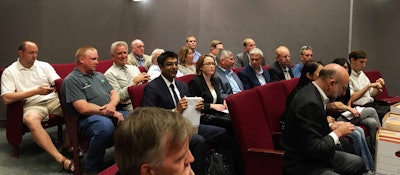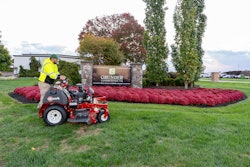 RISE co-plaintiffs in Complete Lawn Care, Inc. et al v. Montgomery County, Maryland, fill the court room to hear Judge Terrence McGann read his ruling from the bench, declaring Bill 52-14’s private property ban to be unlawful and preempted by Maryland law.
RISE co-plaintiffs in Complete Lawn Care, Inc. et al v. Montgomery County, Maryland, fill the court room to hear Judge Terrence McGann read his ruling from the bench, declaring Bill 52-14’s private property ban to be unlawful and preempted by Maryland law.Photo: RISE
Yesterday Montgomery County Circuit Court Judge Terrence McGann struck down the county’s ban of nonessential pesticide usage on private property.
The county in Maryland had passed the legislation back in 2015 and was set to ban the usage of pesticides on private properties starting Jan. 1, 2018, but McGann ruled that the County Council’s law was preempted by state law.
“By generally banning the use of registered pesticides, the ordinance prohibits and frustrates activity that is intended to be permitted by state law, which conflicts with and is thus preempted by state law,” McGann wrote in his 14-page explanation of the ruling. “The county’s ordinance flouts decades of state primacy in ensuring safe and proper pesticide use, undermines the state’s system of comprehensive and uniform product approval and regulation and prohibits products and conduct that have been affirmatively approved and licensed by the state.”
The measure passed in a 6-3 vote in October 2015, but Montgomery Council Executive Isiah (Ike) Leggett refused to sign the bill, concerned about a preemption challenge in court. The bill still became a law because it passed with a veto-proof majority.
Leggett’s concerns were proven right when in November 2016, the Responsible Industry for a Sound Environment (RISE), seven residents, six local businesses and CropLife America filed a legal challenge to the ban.
McGann felt that the county ordinance would have created confusion for both lawn care professionals and citizens who use pesticides and pointed out the Maryland Department of Agriculture and the Environmental Protection Agency (EPA) already evaluate pesticide safety.
“In light of Maryland’s broad regulatory scheme on pesticide use, the ordinance exceeds the county’s power,” McGann said. “From the commercial application process to the minute details of each individual label, the General Assembly has regulated the entire field and, therefore, has evinced clear legislative intent to unilaterally control pesticide use throughout the state.”
Both the National Association of Landscape Professionals (NALP) and RISE celebrated this decision.
“Today’s ruling marks a significant victory for Maryland’s professional landscaping and lawn care businesses and sets an important precedent regarding pesticide use and regulation in the state,” NALP said. “The opinion soundly reinforces the premise that pesticides are highly regulated at the federal and state level and that public health and safety is not served by adding a third layer of regulation.”
The judge’s decision does not reverse the ordinance’s ban of pesticide usage on county property. Karen Reardon, RISE vice president of public affairs, said that the organization focused on the private property portion of the law as the county has the right to do what it wants with its own property and care for it as it sees fit.
“This is a big win for our industry,” she said.
However, not everyone was pleased with McGann’s decision, namely the council members who sponsored and voted for the bill.
“I’m very disappointed in the judge’s ruling,” council member George Leventhal, told Bethesda Magazine. “It’s a worrisome precedent for the ability of local governments to protect their residents on vital issues of health and safety.”
Others are hopeful that the county will appeal the ruling. Julie Taddeo, with the anti-pesticide group Safe Grow Montgomery feels the judge did not make an objective decision.
“I’m hoping the county will appeal this decision because it’s a serious issue affecting health and the environment, our children, wildlife, even bees,” she told Bethesda Magazine. “The judge is really on the wrong side of history. Communities are demanding these laws.”
Reardon says she can’t say if the county will appeal the ruling right now.










